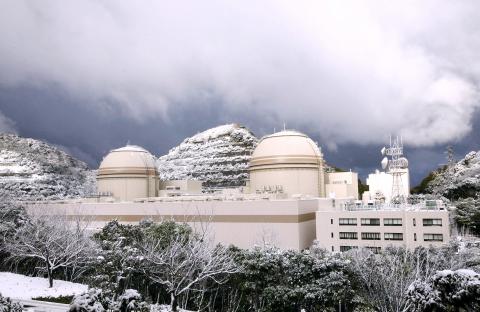Two idled Japanese nuclear reactors have been declared safe and will need to be restarted to avoid a summer power crunch in western Japan, the Japanese trade minister said on Friday, a step toward the first restart in Japan since last year’s Fukushima crisis.
Japanese Trade Minister Yukio Edano also said that he would visit Fukui Prefecture, host to the No. 3 and No. 4 reactors at Kansai Electric Power Co’s Ohi nuclear power plant, yesterday, to meet with the governor and Ohi town mayor and to convince them of the necessity for the restarts.
However, hurdles still remain for the government, which could face a political backlash if it fails to convince the public carrying fresh memories of last year’s radiation crisis at the Fukushima Dai-ichi nuclear power plant, triggered by an earthquake and tsunami.

Photo: Reuters
“We’ve confirmed safety and necessity for restart of the -reactors, and we’re now entering into a stage to seek understanding of local communities and the public,” Edano told a new conference after a meeting on the restart with Japanese Prime Minister Yoshihiko Noda and two other ministers.
“Those outside of Fukushima also saw how a nuclear power plant said to be safe went through a crisis and how people are still living under difficult conditions, so the hurdle to obtain understanding is very high,” Edano said.
The four ministers agreed that the two reactors would be resilient against a severe event like the huge quake and tsunami that wrecked the Fukushima plant and that the restart would be necessary to avoid a sudden power shortage in the summer in Kansai Electric’s service area.
All but one of Japan’s 54 nuclear reactors are now off line, most of them for regular maintenance checks, because public concerns over nuclear safety have kept them from restarting. The last reactor will shut down on May 5.
Edano, who holds the energy portfolio, said that Kansai Electric’s power supply this summer might fall by up to 20 percent short of peak-hour demand and that a sudden power outage would have a wide impact.
Edano set no deadline for the reactor restarts, but implied that he hopes to obtain public backing by July, when the hottest season starts.
Fukui Prefecture, host to 13 reactors, cannot legally block -restarts, but Tokyo has made clear it is reluctant to override wary public opinion.
To some, the government’s push appears too rushed.
“It just seems like they already have an answer and all they are -doing is to go through the -process to make it look as proper as possible,” said 45-year-old Osaka resident Eiji Suzuki, one of the more than 100 anti-nuclear protesters standing outside of the prime minister’s office during the ministers’ meeting.

POLITICAL PATRIARCHS: Recent clashes between Thailand and Cambodia are driven by an escalating feud between rival political families, analysts say The dispute over Thailand and Cambodia’s contested border, which dates back more than a century to disagreements over colonial-era maps, has broken into conflict before. However, the most recent clashes, which erupted on Thursday, have been fueled by another factor: a bitter feud between two powerful political patriarchs. Cambodian Senate President and former prime minister Hun Sen, 72, and former Thai prime minister Thaksin Shinawatra, 76, were once such close friends that they reportedly called one another brothers. Hun Sen has, over the years, supported Thaksin’s family during their long-running power struggle with Thailand’s military. Thaksin and his sister Yingluck stayed

In the sweltering streets of Jakarta, buskers carry towering, hollow puppets and pass around a bucket for donations. Now, they fear becoming outlaws. City authorities said they would crack down on use of the sacred ondel-ondel puppets, which can stand as tall as a truck, and they are drafting legislation to remove what they view as a street nuisance. Performances featuring the puppets — originally used by Jakarta’s Betawi people to ward off evil spirits — would be allowed only at set events. The ban could leave many ondel-ondel buskers in Jakarta jobless. “I am confused and anxious. I fear getting raided or even

Kemal Ozdemir looked up at the bare peaks of Mount Cilo in Turkey’s Kurdish majority southeast. “There were glaciers 10 years ago,” he recalled under a cloudless sky. A mountain guide for 15 years, Ozdemir then turned toward the torrent carrying dozens of blocks of ice below a slope covered with grass and rocks — a sign of glacier loss being exacerbated by global warming. “You can see that there are quite a few pieces of glacier in the water right now ... the reason why the waterfalls flow lushly actually shows us how fast the ice is melting,” he said.

Residents across Japan’s Pacific coast yesterday rushed to higher ground as tsunami warnings following a massive earthquake off Russia’s far east resurfaced painful memories and lessons from the devastating 2011 earthquake and nuclear disaster. Television banners flashed “TSUNAMI! EVACUATE!” and similar warnings as most broadcasters cut regular programming to issue warnings and evacuation orders, as tsunami waves approached Japan’s shores. “Do not be glued to the screen. Evacuate now,” a news presenter at public broadcaster NHK shouted. The warnings resurfaced memories of the March 11, 2011, earthquake, when more than 15,000 people died after a magnitude 9 tremor triggered a massive tsunami that